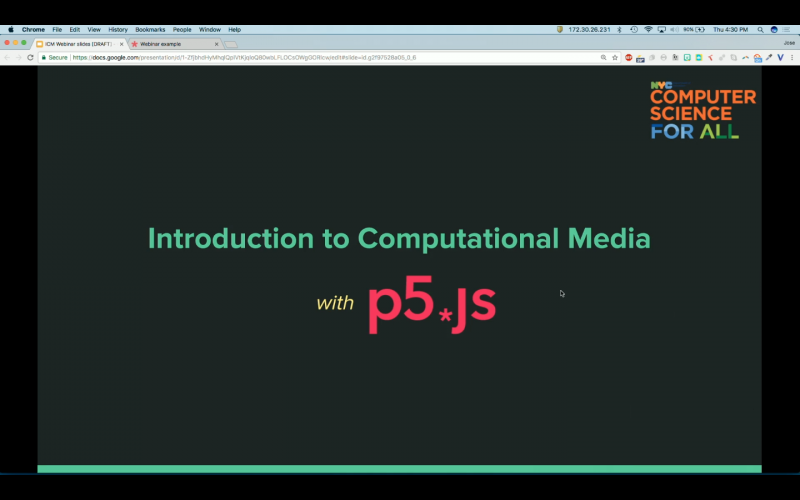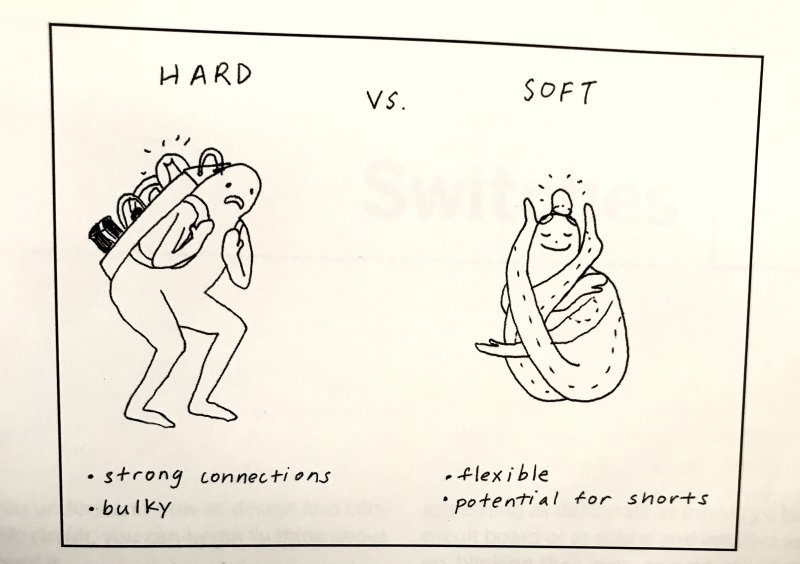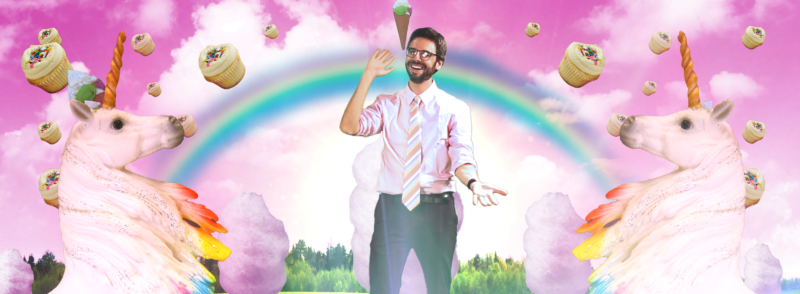createCanvas podcast (2019-2021)
Welcome to createCanvas podcast page, a part of the Education Portal! This page collects free education materials that can be used to teach our software in various classroom settings. Rather than endorse a specific curriculum, we’ve engaged with multiple educators from our community, ranging from K12 teachers to folks who lead workshops at hackerspaces to university professors in interdisciplinary departments. We’ve asked them to share their teaching materials here, which anyone can use. The podcast episodes were published from 2019 to 2021.
To hear more about their approaches and practices, and what they bring to the classroom and why, check out createCanvas, our monthly education podcast, where Saber Khan, our Education Community Director, interviews these innovative educators about teaching at the intersection of art, science, and technology. More about each educator, with links to their curriculum, below.
createCanvas: Sara Hendren (season 2, episode 3)
Episode 2 features an in-depth interview with Sara Hendren, an artist, design researcher, and writer who teaches “Design for Disability” at Olin College of Engineering. Her work has been exhibited widely and is held in the permanent collections of MoMA and the Cooper Hewitt museum. Her writing and design work have been featured in The New York Times and Fast Company and on NPR. Hendren has been a fellow at the New America and Carey Institute for Global Good. She lives in Cambridge, Massachusetts, with her husband and children. Her new book is What Can a Body Do? How We Meet the Built World.
In this episode, Sara discusses how to shift thinking, and teaching, around disability from assistive design to adaptive design. Her book asks the question: “What might assistance based on the body’s stunning capacity for adaptation — rather than a rigid insistence on ‘normalcy’ — look like?” In the classroom, Sara resists the approach of tech-savior-ism and rehab engineering, to instead reframe all technology as adaptive: “take a look at your smartphone, the utensils with which you ate your lunch, the glasses or the contacts that you wear every day, the orthotic shoe on one side that’s helping you with a more comfortable gait — and call that all technology, find yourself in that big plane of existence, which is just an extended body with stuff that has needs.”
The syllabus for the course “Investigating Normal” can be found here.
The syllabus for the course “Critical Designer/Activist Engineer” can be found here.
Both courses are part of the Adaptation and Ability Group, a technical and social lab for creative engineering and design on the subjects of disability, which Sara directs.
Read the interview as a transcript, with images and links, on our Medium Publication here.
createCanvas: Ari Melenciano (season 2, episode 2)
Episode 2 features an in-depth interview with Ari Melenciano, a Brooklyn-based artist, designer, creative technologist, researcher, and educator. In 2017, Ari founded Afrotectopia, a social institution fostering interdisciplinary innovation at the intersections of art, design, technology, Black culture, and activism through collaborative research and practice. She currently teaches creative technology and design at NYU’s Interactive Telecommunications Program, NYU’s Dept. of Digital Photography and Imaging, Pratt Institute’s Communications Design school, and Hunter College’s Integrated Media Arts MFA program.
In this episode, Ari speaks about her experience teaching everything from AP Computer Science, to kindergarten and middle school, to now at the university undergrad and graduate level. Growing up an artist, she explains her approach to art-making within a context of education and activism, as well as a way to move through life. She discusses Afrotectopia’s origins, and what she’s learned about community building and organizing over the years, as it has expanded to include a festival, fellowship program, summer camp, and, in January 2020, The School of Afrotectopia, a program that offered 10 free courses to over 250 students.
The syllabus from the Afrotectopia Imagineer Fellowship can be found here.
Read the interview as a transcript, with images and links, on our Medium Publication here.
createCanvas: Lauren Lee McCarthy (season 2, episode 1)
Kicking off Season 2 is an interview with Lauren Lee McCarthy, an artist, open-source contributor, associate professor at UCLA Design Media Arts, and the creator of p5.js. Lauren is also a member of the Processing Foundation’s Board of Directors. In this episode, Lauren speaks about classroom practices that help to better invite students into spaces where they might not yet see themselves, supporting them with questions like, “How do you make the thing you want to make? What are you trying to say with it? What are the why’s and the who’s of the work that you’re making? And how does it get out there?” Lauren also speaks about the new leadership model of p5.js, and what it means for an open-source project to be sustainable.
Lauren’s Intro to p5 Workshop materials can be found here.
Read the interview as a transcript, with images and links, on our Medium Publication here.
createCanvas: Kelly Lougheed (season 1, episode 4)
In episode 4, Kelly Lougheed talks with Saber Khan about middle-school and high-school computer-science education at all-girls’ schools. Kelly Lougheed is a computer-science teacher in Los Angeles, CA, with experience teaching all levels of secondary CS, from Scratch to AP-level Java. Previously, she worked as a web developer and a Latin teacher. Teaching computer science has been the best of both worlds, as well as the subject of the Master's degree she is currently pursuing. A graduate of an all-girls’ middle and high school, she is particularly interested in girls’ computer-science education and the integration of computer science with art, math, and the humanities.
Kelly’s creative coding curriculum can be accessed on her Medium channel. Here are two beginner-friendly tutorials that use p5.js: Pong Game and Rainbow Paintbrush.
Read the interview as a transcript, with images and links, on our Medium Publication: here’s part 1 and here’s part 2.
createCanvas: Aankit Patel (season 1, episode 3)
In episode 3, Aankit Patel talks Saber Khan about his previous role as Senior Director of Computer Science Academics at NYC Department of Education. Over the past five years, Aankit has worked as a leader of the Computer Science for All movement at the NYC Department of Education, which aims to bring computer science education to all students in all schools by 2025. Aankit talks about how he and his colleagues have found that creative, physical, and critical computing is an approach that jives with both teachers and students. He discusses the details of how teachers need to feel a sense of a larger community practice with their work, and how to do this.
Read the interview as a transcript, with images, video clips, and links, on our Medium Publication: here’s part 1 and here’s part 2.
Check out the NYCDOE CS for All program’s curriculum for “Intro to Computational Media.” “Developed by the NYCDOE CS education team, the Introduction to Computational Media is a yearlong (108 hours) creative computing course for high schools using the open source Javascript library p5.js. By understanding how code can be a medium for creative expression, students will learn the fundamentals of computer science while designing and prototyping interactive projects that run on a browser. Additionally, students will learn how HTML/CSS elements can interact with p5.js to fully take advantage of developing content for a browser. Additionally, students will learn how HTML/CSS elements can interact with p5.js to fully take advantage of developing content for a browser. This course is currently being implemented in NYC public high schools via CS4All’s Software Engineering Program (SEP), CS4All ICM Cohorts, and it aligns with the CS4All Blueprint for CS education.”

createCanvas: Sharon De La Cruz (season 1, episode 2)
In episode 2, Sharon De La Cruz talks with Saber Khan about her work as a multi-disciplinary artist and activist from New York City. Her thought-provoking pieces address a range of issues related to tech, social justice, sexuality, and race. De La Cruz’s work ranges from comics, graffiti, and public-art murals to more recent explorations in interactive sculptures, animation, and coding. In Part 1 of her interview with createCanvas, Sharon talks about joyful resistance and what decolonizing freedom might look like. She discusses her focus on restructuring the dynamics of the classroom, to ensure that POC and other marginalized students don’t have to rely on luck to have access to education. In part 2, Sharon gets into the nitty gritty of what decolonization looks like in the classroom. She discusses how educators with privilege can approach working with marginalized communities, and how folks from those communities themselves are impacted by systemic racism in practice and ideology.
Read the interview as a transcript, with images, video clips, and links, on our Medium Publication: here’s part 1 and here’s part 2.
Check out Sharon’s curriculum for “Intro to Wearables.” The aim of this course is “to teach the basics of circuitry through wearable electronics.” Sharon has found that students learn more about circuits in her Wearables course because they have to work with circuits in different contexts and can see the connections between things in a narrative way. Students are able to understand why a circuit would be used for something in a real-life context and to tell a story with it.

createCanvas: Dan Shiffman (season 1, episode 1)
createCanvas kicks off with an in-depth, two-part interview with Dan Shiffman! Dan is the beloved host of The Coding Train, the vibrant Youtube channel of weekly creative coding tutorials. Dan has been part of the Processing Foundation since before it was a foundation.
In this episode, he talks to Education Community Director Saber Khan about how and why he started making educational materials for creative coding, what open source contribution can look like (spoiler: almost anything!), and he takes us behind the scenes of his YouTube channel, which currently has 889,000 subscribers. In Part 2 of the interview, the discussion continues, covering different sustainability models for open source, the pros and cons of using YouTube as a platform, and how The Coding Train is more about community and documentation than it is about technical expertise.
Read the interview as a transcript, with images, video clips, and links, on our Medium Publication: here’s part 1 and here’s part 2.
Check out The Coding Train’s Youtube Playlist “Code! Programming with p5.js,” which is an excellent playlist of videos for beginners to start to code. You can use the p5.js web editor to code.

Events
CC Fest - Creative Coding Festival
CC Fests are free and inclusive events for students, teachers, and community members to engage in creative coding. Participants are encouraged to spend a day making interactive and engaging digital art, animation, and games. Teachers work on coding projects that they then can bring to their classes. Students are introduced…